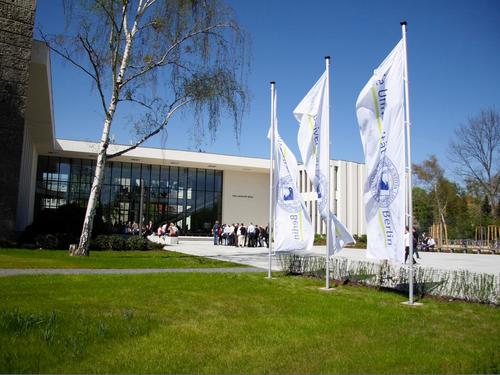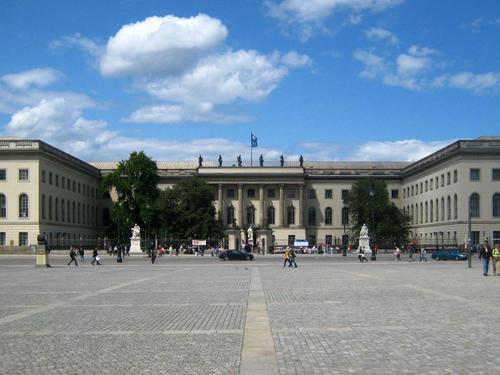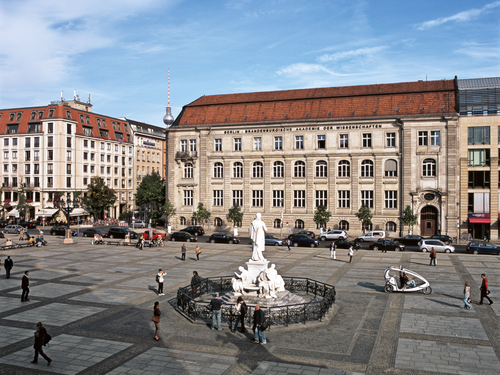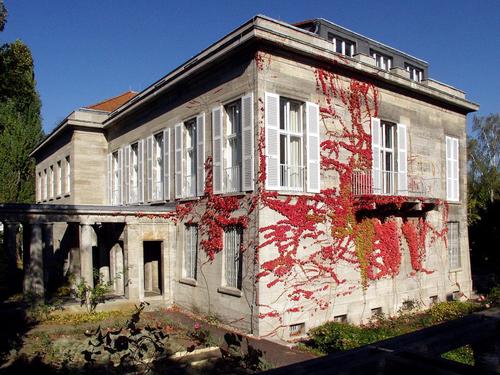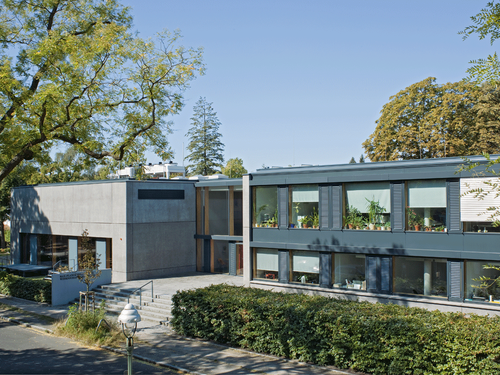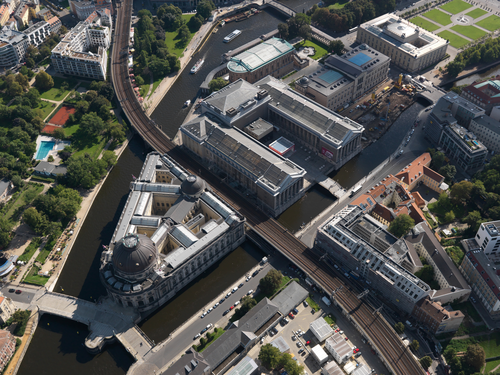The founding institutions of the Berliner Antike-Kolleg
The Berliner Antike-Kolleg (BAK) is supported by ten institutions, which represent the unique concentration and quality of Berlin’s research landscape in an impressive manner:
Freie Universität Berlin | Henry-Ford Building
Image Credit: Freie Universität Berlin, photo: Bernd Wannenmacher
A remarkable number of disciplines dealing with ancient civilizations are concentrated in the Freie Universität Berlin (FUB). A total of around 20 subject areas are dedicated to research on the ancient world in the broadest sense; the distinctly archaeological orientation entails a close connection with the natural sciences, especially with a wealth of expertise in the geosciences in the areas of surveying and environmental reconstruction.
As early as 2004, the FUB had already consolidated its ancient studies expertise in the Interdisziplinäres Zentrum Alte Welt (IZAW), with a view to facilitating trans-disciplinary dialogue. This enabled the development of new research questions that were eventually integrated into the Excellence Cluster Topoi, questions whose further development and transmission now constitute an important educational goal of the Berliner Antike-Kolleg (BAK).
This factor, combined with the wealth of disciplines and the cooperation between the Berlin Graduate School of Ancient Studies (BerGSAS) and the Dahlem Research School (DRS), make the FUB one of the first choices for students and teachers in the fields of ancient studies.
The Humboldt-Universität zu Berlin (HU) has proven strengths in the fields of philosophy, theology, history of science and in research on the transformation of the ancient world. This research is always aimed at gaining an understanding of elements of ancient culture and thought that encompasses their influence on later epochs of European history. Major research topics include ancient worldviews, representations of the cosmos in ancient cultures and the spread of Christianity. Together with other subject areas, the disciplines named are represented in the HU’s August-Boeckh-Antikezentrum. The center was conceived as a platform for discussion, exchange and collective interdisciplinary work, as practiced in the Excellence Cluster Topoi and as the Berliner Antike-Kolleg (BAK) plans to continue practicing in its research and educational activities.
Theooperation with the Humboldt Graduate School (HGS) ensures that training of junior scholars at the Berlin Graduate School of Ancient Studies (BerGSAS) meets high quality standards.
The roots of the Technische Universität Berlin (TU Berlin) stretch all the way back to the time of Frederick II, though it’s current incarnation was founded in 1946. The TU Berlin combines technical, natural science and engineering research with the perspectives of planning studies, the social and economic sciences and the humanities and thus presents a profile with a strongly interdisciplinary orientation.
The TU Berlin also has its own, quite distinct profile within the fields of ancient studies. In particular, research on ancient and pre-modern cultures is well established in the areas of building archaeology and heritage conservation, the history of architecture and urbanism and art and architectural history, with projects on the architecture and planning of ancient cities or analysing and preserving historical structures. There is close cooperation between the TU Berlin and partners of the BAK in the areas of the history of architecture and urbanism and of building archaeology and heritage conservation – for instance, cooperation with the Deutsches Archäologisches Institut, the Stiftung Preußischer Kulturbesitz and the ancient studies departments of the FU Berlin and the HU Berlin.
In addition to its focuses in architecture and in urban and regional planning, the TU Berlin, with its broad range of subject areas, offers numerous other potential anchor points for interdisciplinary cooperation. Combining ancient studies with the TU Berlin’s skills and expertise in the history of science and technology, sociology, engineering and the natural sciences promises to spark new and important impetus for future research collaborations. Thus, the TU Berlin opens up new perspectives for the study of ancient spaces, their physical legacies and the development and reception of those legacies in architecture, technology and society over the course of history up to the present.
The TU Berlin participates in the doctoral programmes: Landscape Archaeology and Architecture (LAA) and Ancient Objects and Visual Studies (AOViS).
With its focuses on Jewish studies, religious studies, philosophy, ancient history and classical philology, the Universität Potsdam (UP) boasts an intriguing ancient studies profile. The expertise concentrated there in the areas of teaching methodology and the reception of the ancient world in particular should be highlighted here, for it ensures that the contemporary relevance of research on the ancient world is a consideration right from the start, thus enabling the research to open up new perspectives on the present day.
As well as having a significant influence on the research conducted at the UP, this attention to present-day relevance plays a major role in the training of the next generation of scholars. The recently established BA programme Sprachen und Kulturen der Antike und des Mittelalters (Languages and Cultures of Antiquity and the Middle Ages) is a striking example of this: the programme is specifically designed to give students an understanding of the significance of pre-modern cultures for later epochs up to and including the present day.
The UP’s experiences in this area will also inform their constructive contributions to the further strategic development of ancient studies research within the BAK.
The UP participates in the doctoral programmes Ancient Philosophy and History of Ancient Studies (APhil/HistAS) and Ancient Languages and Texts (ALT).
Scholars of the Berlin-Brandenburgische Akademie der Wissenschaften (BBAW, Berlin-Brandenburg Academy of Sciences and Humanities) have engaged in research on Greek and Roman inscriptions, coins and ancient medical texts and pursued studies of the Egyptian language since the 19th century. The Academy also possesses a unique editorial expertise that will enrich the work of the Berliner Antike-Kolleg (BAK). Many of the research projects in ancient studies initiated in the 19th century, such as the Inscriptiones Graecae, the Corpus Inscriptionum Latinarum (CIL), the Ancient Egyptian Dictionary and Turfan Studies are still thriving today, while new projects such as Corpus Coranicum and the Alexandrian and Antiochene biblical exegesis in late antiquity and Galen projects have recently been initiated.
In 2005, the academy consolidated its research projects in ancient studies into a single institution, the Zentrum Grundlagenforschung Alte Welt.
Its goal in cooperating with the BAK is to sharpen its research profile in ancient studies, while at the same time contributing to the education of junior scholars through Berlin Graduate School of Ancient Studies (BerGSAS):
The BBAW is engaged in the doctoral programs: Ancient Languages and Texts (ALT); Ancient Philosophie/History of Ancient Science (APhil/HistAS); Languages and Cultures of the Silk Road (Silk Road)
The Bundesanstalt für Materialforschung und -prüfung (BAM) ensures safety in technology and chemistry. The BAM conducts tests and research and provides advice on the protection of people, the environment and property. It is active in the cause of preserving cultural heritage. The BAM’s Division 4.5, Analysis of Artefacts and Cultural Assets engages in application-oriented research on the preservation, conservation and restoration of works of art and cultural assets. The main focus in this respect is the development and use of modern material-science analytical methods.
The BAM works closely with a variety of research institutions, including several BAK partner institutions, such as the Deutsches Archäologisches Institut (DAI), the Stiftung Preußischer Kulturbesitz (SPK) and the Berlin universities. In joint projects with them, the BAM analyses and evaluates archival and museum collections or investigates archaeological finds, ancient manuscripts and historical structures/monuments. Thus, the skills and abilities concentrated at the BAM make key contributions towards answering questions relating to cultural history that cannot not be satisfactorily resolved through the use of ancient studies methods alone. Thus, the BAK is an important partner in the BAK, to no small extent due to the new perspectives for future research projects combining the natural sciences and ancient studies that its membership as a partner creates.
The BAM participates in the doctoral programme: Ancient Objects and Visual Studies (AOViS).
The Charité – Universitätsmedizin Berlin (Charité) is one of the most prestigious medical institutions in Europe. In addition, excellent research and teaching in the fields of modern medicine, Charité researchers engage in the critical analysis of the history, theory and ethics of medicine.
The Institute of the History of Medicine and Ethics in Medicine plays a central role in this respect. Research there focuses in on medical knowledge and activities in various cutural, ethical and social contexts of the past and the present. The Charité’s Berlin Museum of Medical History (BMM), with its diverse exhibition projects, also offers important insights into medicine’s historical dimensions and their relevance to current events and developments.
Within the BAK, the Charité cooperates with its partners promote joint research in the area of the history of medicine and the medical humanities and to open up new perspectives on the origins, transformations and cultural embeddedness of medical knowledge from Antiquity up into the present. It also adds an important component to the historical/history of science work being done within the Berlin ancient studies cooperation framework.
The Charité participates in the doctoral programmes: Ancient Philosophy and History of Ancient Studies (APhil/HistAS) and Ancient Languages and Texts (ALT).
Headquarters of the Deutsche Archäologische Institut | Theodor Wiegand Building
Image Credit: DAI, photo: Peter Grunwald
Since its founding in 1829, the Deutsche Archäologische Institut (DAI, German Archaeological Institute) has been a leading internationally active institution in the fields of archeology and ancient studies. Today, it is involved in research on five continents and its numerous departments and commissions maintain 15 offices in numerous countries. It enjoys excellent relations with research institutions in the countries of the Mediterranean region and in the region of the former Soviet Union, Asia, Africa and South America. The activities of the DAI staff serve both to further scholarship and to increase the accessibility of the cultural heritage of the respective countries. Thus, the DAI, falling as it does within the remit of the German Federal Foreign Office, plays an important role in the foreign policy of the Federal Republic of Germany in the areas of cultural relations and education.
Numerous DAI projects are pursued in the form of inter- and trans-disciplinary clusters, whose research frequently unites the humanities and natural sciences.
The DAI contributes its exceptional expertise in archaeological excavation and landscape reconstruction to the Berliner Antike-Kolleg (BAK), enriching the training of junior scholars through Berlin Graduate School of Ancient Studies (BerGSAS), as well as other aspects of the BAKs work.
The DAI is engaged in the doctoral programmes: Landscape Archaeology and Architecture (LAA); Languages and Cultures of the Silk Road (Silk Road)
The Max-Planck-Institut für Wissenschaftsgeschichte (MPIWG, Max Planck Institute for the History of Science) conducts research into how, in the course of centuries of interaction between the sciences and the surrounding cultures, new categories of thought, evidence and experience have evolved. One of the central research subjects is the globalization of knowledge, with individual projects encompassing several millennia and dealing with cultures from all parts of the globe. The projects extend from Babylonian mathematics to modern-day genetics, from the natural sciences of the Renaissance to the early days of quantum mechanics.
The institute views ancient studies research as a central area of the history of knowledge, an area that will be further explored through the institute’s involvement in the Berliner Antike-Kolleg (BAK) and the Berlin Graduate School of Ancient Studies (BerGSAS).
The MPIWG is engaged in the doctoral program: Ancient Philosophy/History of Ancient Science (APhil/HistAS)
The Stiftung Preußischer Kulturbesitz (SPK, Prussian Cultural Heritage Foundation) unites the Staatsbibliothek and numerous museums with diverse themes under a single umbrella; this includes the Ägyptische Museum, the Antikensammlung, the Museum für Vor- und Frühgeschichte, the Pergamonmuseum and the Vorderasiatische Museum. The collections and holdings are both encyclopedic and universal; they document the cultural development of mankind from the early stages to the present, and combine to form a unique basis for research. An especially unique characteristic of the collections is that they cover all branches of cultural heritage.
Furthermore, the interdisciplinary work at the Berliner Antike-Kolleg (BAK) benefits from the fact that the activities and knowledge archives of the SPK are situated at the interface of art and culture on the one hand, and of knowledge and research on the other – a position especially beneficial for junior scholars at Berlin Graduate School of Ancient Studies (BerGSAS).
The SPK is engaged in the doctoral programs: Ancient Objects and Visual Studies (AOViS); Languages and Cultures of the Silk Road (Silk Road)

